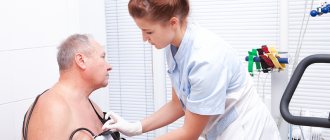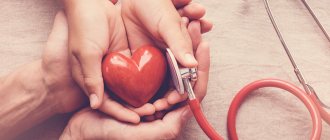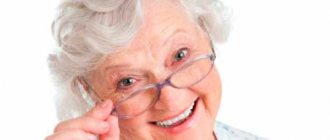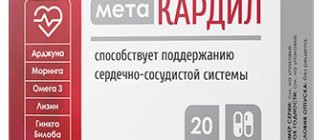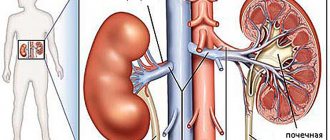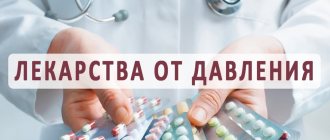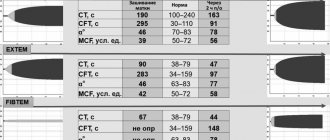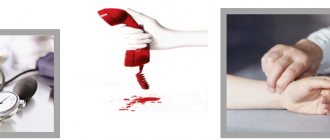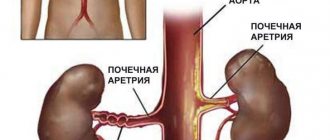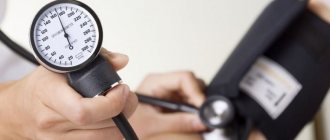Causes of the disease
Arterial hypertension is a disorder of the cardiovascular system, characterized by an increase in systolic blood pressure (the first digit on the tonometer) above 140 mm Hg.
Art. and/or diastolic (second digit) – above 90 mm Hg. Art. It can occur as an independent disease or result from another pathology. The most common is hypertension or essential hypertension, which develops independently, without obvious reasons. It occurs in 90% of patients with high blood pressure.1
Secondary or symptomatic hypertension is directly related to other diseases or factors that can be controlled.1 This form of the disease is usually suspected in young people under 30 years of age with high blood pressure.
The main causes of secondary arterial hypertension are2:
- Obstructive sleep apnea syndrome.
- Kidney diseases.
- Neoplasms of the adrenal glands – pheochromocytoma.
- Pathologies of the thyroid gland: thyrotoxicosis, hypothyroidism.
- Congenital abnormalities of the heart and blood vessels, including coarctation of the aorta.
- Primary hyperaldosteronism.
- Itsenko-Cushing syndrome.
- Side effects of medications such as: oral contraceptives, non-steroidal anti-inflammatory drugs, antiviral drugs.
Risk factors
There are a number of factors that increase the likelihood of developing hypertension. The most significant include:
- Age. The risk of high blood pressure increases with age, mainly after age 65.
- Hereditary tendency to arterial hypertension.
- Overweight.
- Physical inactivity, lack of physical activity.
- Smoking, including passive smoking.
- Excess salt and potassium-containing foods in the diet.
- Alcohol abuse.
- Chronic stress, frequent emotional stress and lack of sleep.
- Pregnancy.
- Early menopause.
- Heart rate exceeding 80 beats/min at rest.
Reasons for the development of arterial hypertension
The exact cause of the development of hypertension has not yet been established, however, a clear relationship has been identified between hypertension and the following factors:
- Exposure to stress;
- hereditary predisposition;
- age;
- gender (AH is more common in men);
- abuse of table salt;
- smoking and alcohol;
- endocrine disorders;
- excess body weight;
- physical inactivity;
- kidney diseases;
- increased adrenaline levels;
What are the different degrees of hypertension?
Normal blood pressure is considered to be between 110/70 and 130/85 mm Hg. Art., which on average is the well-known 120/80 mm Hg. Art. With arterial hypertension, there is an increase in systolic blood pressure above 140 mm Hg. Art. and/or diastolic above 90 mm Hg. Art.
The degrees of hypertension are determined depending on the systolic (SBP) and/or diastolic (DBP) blood pressure (Fig. 1).
Figure 1. Degrees of hypertension in adults. Source: MedPortal, photo by cottonbro: Pexels
As a rule, at the first stage of development of hypertension, serious structural changes in the internal organs and structures of the body do not yet occur.
If hypertension continues to develop, over time, excessive blood pressure on the walls of the arteries will negatively affect both the blood vessels themselves and the target organs: the brain, retina, heart. The higher the pressure and the longer it remains uncontrolled, the greater the potential threat of decreased visual acuity, deterioration of cognitive abilities, heart pain, etc.
The most significant complications of arterial hypertension are:
- Myocardial infarction.
- Heart failure.
- Loss of visual acuity and blindness.
- Stroke.
- Dementia.
Hypertensive crisis is a complication of arterial hypertension in which blood pressure suddenly rises to 180/120 mmHg. Art. and more. In this case, direct damage to target organs occurs. This condition requires emergency medical care in a hospital setting.
Complications of arterial hypertension
Under conditions of constantly elevated blood pressure, the walls of blood vessels thicken and lose their ability to relax, which prevents normal blood supply and saturation of tissues and organs with oxygen and nutrients. Various serious complications arise, including the following:
- Hypertensive crisis;
- myocardial infarction;
- stroke;
- angina pectoris;
- heart failure;
- cardiac ischemia;
- chronic renal failure;
- retinopathy;
- atherosclerosis, etc.
Differences between degrees and stages of hypertension
In clinical practice, several classifications of arterial hypertension are used simultaneously. Of key importance is the division of this pathology into degrees and stages of development.1
If the degree is determined depending on the pressure indicators, then the stage of the disease depends on the severity of target organ damage and the presence of clinical conditions associated with high blood pressure, diabetes mellitus and chronic kidney disease. There are 3 stages of arterial hypertension:
- Stage I: There is no end organ damage or associated clinical conditions, but there are associated risk factors. In addition to those previously mentioned, this also includes a number of laboratory indicators: lipid and blood sugar levels, uric acid and others.
- Stage II. There is asymptomatic target organ damage, determined by the results of additional examination and/or stage 3 chronic kidney disease and/or concomitant uncomplicated diabetes mellitus.
- Stage III. The presence of manifesting target organ damage and clinical conditions associated with hypertension, stage 4-5 chronic kidney disease or complicated diabetes mellitus.
How to diagnose the disease?
When the first symptoms of hypertension appear, consult a cardiologist. He will conduct an examination and refer you for tests:
- general blood and urine analysis;
- blood test for hemoglobin;
- urine test for protein and glucose;
- electrocardiography;
- echocardiography;
- chest x-ray;
- biochemical blood test to detect cholesterol, urea, glucose and calcium levels;
- phosphates and uric acid;
- CT scan;
- ultrasonography.
Based on the results of the tests, the attending physician will determine whether hypertension is present, the stability of the increase in pressure, the degree of development of pathological changes in the internal organs, and the cause of the increased pressure.
Symptoms of stage 1 hypertension
Clinical manifestations of stage 1 hypertension often go unnoticed or are completely absent, since the body’s compensatory capabilities neutralize a slight increase in blood pressure.3 Because of this, the disease is often called the “silent killer.”
If high blood pressure levels persist for a long time, nonspecific symptoms may appear, including:
- Throbbing or pressing headache with the epicenter in the occipital region.
- Tinnitus and dizziness.
- Flashing "flies" before the eyes.
- Increased and rapid heartbeat.
- Nosebleeds.
- Poor exercise tolerance and shortness of breath.
- Swelling of the lower extremities, numbness in the legs.
When should you see a doctor?
In most cases, arterial hypertension is detected during a routine examination or seeking medical help for another disease or condition. Therefore, if there are risk factors, regular visits to your family doctor or primary care physician are recommended.
An unscheduled consultation or call to emergency medical services is required in the following situations:
- Decreased effectiveness of medications taken – situations where previously effective antihypertensive drugs no longer work.
- Increased blood pressure during treatment.
- The appearance of side effects from drug therapy.
- Deterioration of general condition while maintaining current blood pressure numbers.
- A sharp increase in blood pressure to more than 180/120 mmHg. Art., that is, the development of a hypertensive crisis.
- A sudden decrease in systolic or diastolic blood pressure of 30 mm Hg. Art. and more.
Prevention
Methods for preventing the disease are primary and secondary.
Primary prevention is necessary for healthy people who are predisposed to pathology. You need to go in for sports, fitness, do morning exercises, swim. It is important to consider that the loads should be moderate or light. A person also needs to give up bad habits, limit the consumption of salt, carbohydrates and animal fats. The diet should be enriched with calcium and potassium (dairy products, nuts, dried fruits, etc.).
Secondary prevention is carried out in patients who have been diagnosed with hypertension. It includes monitoring blood pressure, regular visits to the doctor and non-drug therapy. It is recommended to conduct acupuncture sessions, massage, and take herbal remedies and antioxidants.
The ABC-Medicine clinic provides a full range of services for the diagnosis, prevention and treatment of hypertension. Call us at + and our consultants will answer all your questions in detail and make an appointment with a cardiologist.
Modern diagnostic methods
24-hour blood pressure monitoring can help diagnose hypertension.
Photo: Minaart / Depositphotos The diagnosis is often made based on blood pressure readings obtained from tonometry and patient interview data.
In order to identify potential causes, as well as to assess risks to human health and select the most appropriate treatment regimen, a number of laboratory and instrumental studies are additionally carried out.
The examination program for a patient with arterial hypertension includes:
- Laboratory tests. This includes routine general blood and urine tests, as well as determination of a number of biochemical parameters, including: blood glucose, uric acid, sodium and potassium levels, total cholesterol and high and low density lipoproteins (HDL-C, LDL-C), serum creatinine blood followed by calculation of glomerular filtration rate (GFR).1
- Instrumental diagnostics. For patients with newly diagnosed arterial hypertension, in order to exclude white coat hypertension (increased pressure as a result of fear or “tremor” in front of the doctor), 24-hour blood pressure monitoring with simultaneous recording of an electrocardiogram (ECG) according to Holter is recommended. Also, if necessary, ECHO-CG, ultrasound diagnostics of the kidneys, duplex scanning of the vessels of the kidneys, head and neck, fundus examination (ophthalmoscopy), computed tomography or magnetic resonance imaging (CT or MRI) of the brain are performed.1
Features of treatment. Conservative therapy
Treatment tactics depend on the results of previous diagnostics and laboratory parameters, as well as the risk of developing cardiovascular complications. However, in the conservative treatment of arterial hypertension of the 1st degree, a key place is occupied by lifestyle correction, which, if necessary, can be supplemented with pharmacotherapy.
Lifestyle changes: tips for patients with hypertension
The first and one of the most important aspects in the treatment of arterial hypertension and the prevention of complications is changing a person’s behavior and habits, aimed at eliminating or minimizing risk factors. Recommendations for patients with hypertension include7:
- Quitting the consumption of alcoholic beverages and tobacco products.
- Rational, balanced nutrition. In this case, preference should be given to fruits and vegetables, whole grains and fish, avoiding foods high in salt and trans fats.
- Normalization of body weight, treatment of obesity.
- Maintaining moderate physical activity, neck exercises, massages.
- Limit your intake of sugar and high carbohydrate foods.
- Avoiding frequent stress.
- Normalization of the daily routine, ensuring adequate sleep.
What foods should you not eat if you have high blood pressure?
Eating certain foods that increase blood pressure can be dangerous if a person already has hypertension. In this case, follow a special diet, excluding or limiting the use of:
- salts, seasonings and food additives containing sodium;
- strong tea, coffee containing caffeine;
- fatty, fried, spicy foods;
- pickles and canned foods;
- smoked meats;
- baked goods, sweets;
- fast food;
- sweet carbonated drinks;
- frozen semi-finished products: pizza, dumplings (may contain a lot of sugar, sodium, saturated fat to preserve taste);
- alcohol.
One of the tools for monitoring your condition is the so-called pressure diaries. They should record your systolic and diastolic blood pressure readings every day, adding comments regarding your well-being if necessary.
Also, do not miss follow-up visits to the doctor. In this way, the doctor will be able to monitor the effectiveness of the treatment prescribed and, if necessary, make adjustments or replace insufficiently effective medications.
How to measure blood pressure using a mechanical tonometer
In order to measure pressure with a mechanical tonometer (video 1), you need:
- sit in a comfortable position and relax, while your arm should be bent at the elbow joint and lie on a flat surface,
- remove the shoulder part of the arm from clothing and fasten the cuff on it (its lower edge should be 3-4 cm above the elbow bend),
- place a stethoscope (phonendoscope) on the inside of the elbow joint in the place where the pulse can best be felt,
- using a hand pump, start pumping air into the cuff,
- bring the pressure gauge needle to values exceeding the expected pressure by 30-40 mm. rt. Art. (for example, if the patient’s normal blood pressure is 135/90, then you can stop at 170),
- slowly release air from the cuff, waiting for tones to appear - these are the sounds of a heartbeat; their appearance marks the boundary of systolic pressure, and their disappearance marks the boundary of diastolic pressure. Simply put, if tones appeared at number 150 and disappeared at number 100, then the result is 150/100).
Video 1. How to correctly measure pressure with a mechanical tonometer.
Drug treatment
Drug therapy is usually prescribed if lifestyle changes have not normalized blood pressure within 3 months.1 Depending on the presence of structural changes in target organs and the risk of complications, one or more drugs may be used. The main means are:
- Angiotensin-converting enzyme inhibitors (ACE inhibitors): captopril, ramipril. They help relax blood vessels, blocking the formation of ACE, a chemical that constricts them.
- Angiotensin II receptor blockers: valsartan, losartan. These medications relax the blood vessels, blocking the action rather than the formation of ACE.
- Calcium channel blockers: verapamil, nifedipine. They relax blood vessels and can also slow down the heart rate. Often prescribed to elderly people.
- Diuretics. There are different classes of diuretics, including thiazide (hydrochlorothiazide), loop (furosemide), and potassium-sparing (triamterene).
- β-blockers: atenolol, bisoprolol. They reduce the strength and frequency of heart contractions, also dilating blood vessels.
Additional agents that can be used as adjuvant therapy in certain situations2:
- α-blockers: doxazosin, prazosin. Suppress nerve signals traveling to blood vessels, reducing the effect of natural chemicals that narrow them.
- Aldosterone antagonists: spironolactone, eplerenone. They block the action of aldosterone, which is responsible for maintaining salt and fluid in the body and can contribute to increased blood pressure.
- Vasodilators: hydralazine and minoxidil. They act directly on the muscles of the artery walls, preventing their contraction.
- Renin inhibitors: aliskiren. They slow down the production of renin, a kidney enzyme that triggers a chain of chemical reactions that increases blood pressure.
Important! When using drug treatment, you should clearly know the areas of application of a particular drug recommended by your doctor. Some medications should be taken regularly, regardless of blood pressure readings and even in situations where the numbers are within the normal range. Other medications are used only when necessary, for example, when there is a sudden increase in blood pressure and a deterioration in general condition. It is better to always have such drugs with you.
What to do during a hypertensive crisis?
Vivid symptoms of hypertension usually occur with a sharp rise in blood pressure - the development of a hypertensive crisis. When the pressure rises above 220/120 mmHg. Art. and/or the appearance of symptoms of a complicated crisis (severe weakness, nausea, vomiting, visual disturbances, acute headache, heart pain, impaired speech or consciousness, limitation of movements in the limbs), it is necessary to urgently call emergency help.
Emergency actions in this situation boil down to ventilating the room, maintaining bed rest, maintaining a calm environment, and taking antihypertensive drugs (Fig. 2).
Figure 2. First aid for hypertensive crisis. Source: MedPortal
Treatment of hypertension at the clinic “Mom, Dad, Me”
At the first signs of increased blood pressure, we recommend that you contact a cardiologist at one of the branches of the “Mom, Dad, Me” family clinic network, located in Moscow. Our advantages:
- reception of adults;
- performing the most important diagnostic studies - ECG, EchoCG, HM ECG;
- if myocardial infarction is suspected, urgent determination of troponins in the blood;
- in-depth laboratory diagnosis of metabolic disorders aggravating the course of hypertension;
- development of an individual treatment and observation plan;
- affordable prices for services in our clinic.
Reviews
Marina Petrovna
The doctor carefully examined my husband, prescribed an ECG and made a preliminary diagnosis. She gave recommendations on our situation and ordered additional examination. No comments so far. Financial agreements have been met.
Roakh Efim Borisovich
I am simply delighted with the doctor and the clinic. I haven't had fun in clinics for a long time. Everything went perfectly from a logistics point of view, strictly on time. I also received aesthetic pleasure both as a patient and as a person. I could communicate and this communication gave me great pleasure. My deepest bow to the ultrasound doctor.
Luzina Sofya Khamitovna
I really liked Dr. Vlasova. Pleasant and sweet woman, a good specialist. I received an answer to all my questions, the doctor gave me a lot of good advice. I was more than satisfied with the visit.
Evgeniya
We visited the “Mama Papa Ya” Clinic with our child. A consultation with a pediatric cardiologist was needed. I liked the clinic. Good service, doctors. There was no queue, everything was the same price.
Olga
I really liked the clinic. Helpful staff. I had an appointment with gynecologist E.A. Mikhailova. I was satisfied, there are more such doctors. Thank you!!!
Anonymous user
I removed a lump from Alina Sergeevna, the operation was great! Many thanks to her for her sensitive attention and approach to every detail.
Anonymous user
Today I was treated at the clinic, I was satisfied with the staff, as well as the gynecologist. Everyone treats patients with respect and attention. Many thanks to them and continued prosperity.
Iratyev V.V.
The Mama Papa Ya clinic in Lyubertsy is very good. The team is friendly and responsive. I recommend this clinic to all my friends. Thanks to all doctors and administrators. I wish the clinic prosperity and many adequate clients.
Belova E.M.
Today I had a mole removed on my face from dermatologist I.A. Kodareva. The doctor is very neat! Correct! Thanks a lot! Administrator Yulia Borshchevskaya is friendly and accurately fulfills her duties.
Anonymous user
I would like to express my gratitude to the staff of the clinic: Mom, Dad, and me. The clinic has a very friendly atmosphere, a very friendly and cheerful team and highly qualified specialists. Thank you very much! I wish your clinic prosperity.
Christina
I liked the first visit. They examined me carefully, prescribed additional examinations, and gave me good recommendations. I will continue treatment further; I liked the conditions at the clinic.
Anna
Good clinic, good doctor! Raisa Vasilievna can clearly and clearly explain what the problem is. If something is wrong, she speaks about everything directly, not in a veiled way, as other doctors sometimes do. I don’t regret that I ended up with her.
Folk remedies against hypertension
Ginger tea is beneficial for people with high blood pressure.
Photo: jcomp - ru.freepik.com In addition to drug therapy, traditional methods of treatment can be effective adjuncts. They include a variety of tinctures and decoctions from various plants, roots, leaves or berries. The following have a proven antihypertensive effect:
- Ginger tea.
- Ginseng infusions and teas.
- Foot compresses with apple cider vinegar.
- Decoctions with sunflower seeds.
- Pomegranate juice.
- Dark chocolate (containing at least 60-70% cocoa, in moderation) and cocoa.
- Celery juice.
- Garlic.
- White mistletoe decoction.
- Dietary supplements or foods that increase nitric oxide or dilate blood vessels (vasodilators), such as: cocoa, coenzyme Q10, L-arginine.
- Omega-3 fatty acids found in oily fish, high fish oil supplements and flax seeds.
Various procedures can also help reduce high blood pressure, including massage courses for the back and collar area, contrasting water procedures for the feet and hands, etc.5, 6
Important! Traditional medicine cannot be the only method of treatment. Also, many medicinal plants contain biologically active substances that can cause adverse reactions. Therefore, before using them, you should definitely consult a doctor.
Forecast
With arterial hypertension of the 1st degree, as a rule, it is possible to avoid a further increase in blood pressure without the use of pills - by eliminating risk factors and changing a person’s lifestyle.
However, sometimes it is impossible to do without appropriate antihypertensive therapy and drug treatment. Taken together, following simple rules of behavior and regularly taking pills allows you to most effectively control the condition and prevent the development of serious complications such as myocardial infarction or stroke.
Sources
- Russian Cardiological Society. Clinical guidelines “Arterial hypertension in adults”, 2021.
- High blood pressure (hypertension). Mayo clinic. 2021.
- T. V. Ashcheulova, T. N. Ambrosova, V. I. Smirnova. “The main symptoms and syndromes of hypertension and symptomatic arterial hypertension: method. decree. for students” / comp. – Kharkov: KhNMU, 2021. – 32 p.
- Tabassum N, Ahmad F. Role of natural herbs in the treatment of hypertension. Pharmacogn Rev. 2011;5(9):30-40.
- Givi M. Durability of effect of massage therapy on blood pressure. Int J Prev Med. 2013;4(5):511-516.
- Mohebbi Z, Moghadasi M, Homayouni K, Nikou MH. The effect of back massage on blood pressure in the patients with primary hypertension in 2012-2013: a randomized clinical trial. Int J Community Based Nurses Midwifery. 2014;2(4):251-258.
- Marjorie Hecht "Types and Stages of Hypertension". Healthline. 2019.
